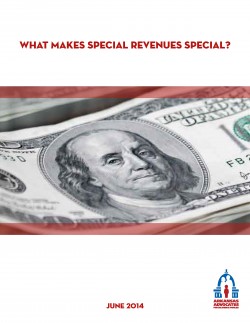
When you fill up your car at the gas station, you pay a motor fuel tax that directly benefits the Highway Department Fund. If a relative from out of state visits and pays for a hotel room in Arkansas, he or she pays a two percent tourism tax that directly credits the Tourism Development Fund. Taxes like these are called “special revenues” and they fund important programs in Arkansas every day.
Special revenues are different from other taxes because all of the money collected goes to specific, predetermined funds. This is why Special revenues are sometimes referred to as “Dedicated Taxes.”
Special revenues are usually more targeted than general revenue collections, like the income tax. The people who pay these taxes and fees often benefit more from the programs they fund. For example, frequent drivers pay more motor fuel tax and therefore help contribute more to maintaining the roads they use. Similarly, frequent travelers contribute more to tourism development. For most special revenues there is usually, but not always, a direct connection between the fee being paid or the item/service being taxed and the programs that special revenue helps fund.
Motor fuel taxes, for example are used to maintain the state’s highways and roads. It is important to be aware that many special revenue taxes disproportionately impact low- and middle-income families. These families pay a higher share because they spend a larger portion of their income on necessities like motor fuel, and other goods frequently associated with special revenue taxes.
Most state taxes are “general revenues” (like the individual income tax) and are pooled together and then distributed to departments and programs funds based on the agency budgets approved by the Arkansas General Assembly in legislative sessions. During legislative sessions, the legislature devotes more attention to how to allocate/budget general revenues because they have greater flexibility on how to allocate these funds. They devote less time to how to allocate special revenues because the purposes/programs on which special revenues are spent have typically already been spelled out in existing law. It should be noted that some taxes have both a general and special revenue component.
Although special revenues get less attention, they still represent about 10 percent of all state and federal revenue in Arkansas. In 2013 general revenue collections in Arkansas totaled $5 billion while special revenue collections amounted to $1.7 billion. Special revenues in Arkansas experienced a dip during the recession but have since shown steady increases.
It is typical for tax revenue to follow overall economic patterns because during leaner times people are spending less on taxable goods and services, especially on purchases they view as less essential in nature.
Before the enactment of the revenue stabilization law in 1945, all revenues were collected for specific purposes. Essentially, all taxes were special revenues. This created a problematic, inflexible budget where “some services became ‘over funded’ while others were ‘short’” regardless of the importance of the program.
